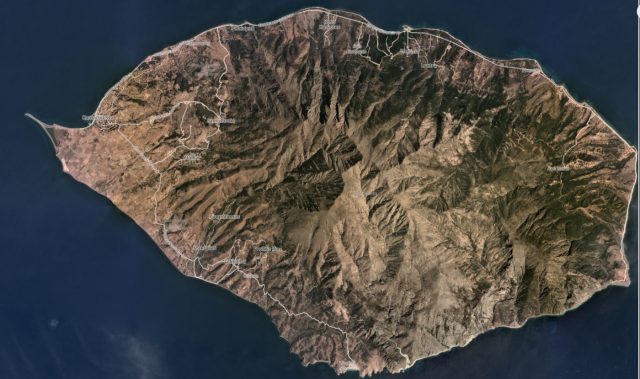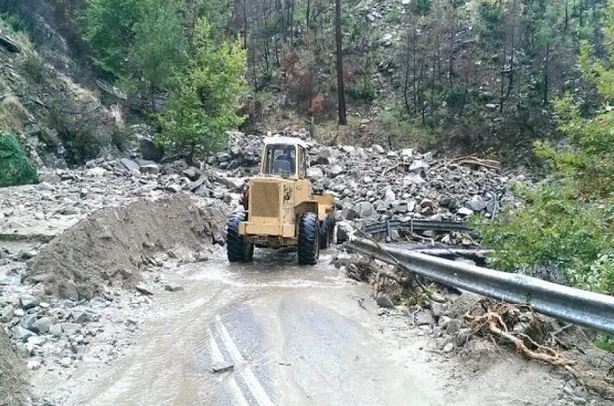8 October 2019
Samothraki: the role of goats in increasing landslide hazard
Posted by Dave Petley
Samothraki: the role of goats in increasing landslide hazard
There is an interesting set of articles in a couple of the Greek facing online newspapers at the moment about the landslide problems on the island of Samothraki (which is sometimes written Samothrace) in Greece. This is a small island (with an area of 178 km² and population of 2859, it extends over 17 km from east to west). Samothraki is described in Wikipedia as being one of Greece’s most rugged islands:-

Planet Labs three month composite image of the island of Samothraki. Image copyright Planet Labs, used with permission.
.
Unfortunately, the ruggedness of the island has meant that farming has been a challenge, which has led the population to farm goats, allowing them to roam with little control. Unfortunately the population of goats boomed, reaching 75,000 by the late 1990s. The goats stripped the island of its natural vegetation, and prevented regrowth. This has left the island bereft of its natural protection against landslides, resulting in high vulnerability to heavy rainfall. In September 2017, the island suffered floods and landslides as a result:-

The aftermath of the heavy rainfall in Samothraki in September 2017. Image from Keep Talking Greece.
.
This is of course a classic example of the Tragedy of the Commons, in which individual action as a result of self-interest leads to outcomes that are contrary to the common-good. The goat population has now dropped to about 50,000, and the lack of food means that the animals have a low value, but without support it is difficult to change the farming method. The upshot is that the vulnerability of the island remains high, and with rainfall likely to increase in intensity as the effects of global heating continue to develop, further landslides are inevitable.
Fortunately, an effort is now underway to reverse the problem. A sustainability initiative, led by the Sustainable Samothraki Association is seeking solutions to the goat crisis, with the aim of achieving UNESCO Biosphere Reserve status. This is not simply a nice-to-have initiative, but a genuine and essential attempt to improve the islands to the benefit of the population, and to reduce losses from landslides and floods.
This same situation of rampant environmental destruction is playing out in many other upland areas around the world; similar initiatives are needed in many places as part of our efforts to reverse the unacceptable levels of damage we are inflicting on our environment.
Reference
Planet Team (2019). Planet Application Program Interface: In Space for Life on Earth. San Francisco, CA. https://www.planet.com/


 Dave Petley is the Vice-Chancellor of the University of Hull in the United Kingdom. His blog provides commentary and analysis of landslide events occurring worldwide, including the landslides themselves, latest research, and conferences and meetings.
Dave Petley is the Vice-Chancellor of the University of Hull in the United Kingdom. His blog provides commentary and analysis of landslide events occurring worldwide, including the landslides themselves, latest research, and conferences and meetings.
I went wild camping here once. Arrived late afternoon by ferry and did not find a pitch my tent till dark which happened to be by stream. Next morning after cleaning up my bowl from breakfast and then brushing my teeth in this stream. I decided to take a short walk up stream only to find a dead goat wedged behind a boulder permeating it juices into that fresh mountain water. Yummy.
Have just informed myself about Samothrace, thanks to the excellent links you provide. Also read up on the “tradgedy of the commons”, the “invisible hand”, and Adam Smith.
Seems to me, that if we can’t soon dispense with “laissez faire” commerce, our planet will be entirely “Samothraced”. Or (as surmised) “Easter Islanded”.